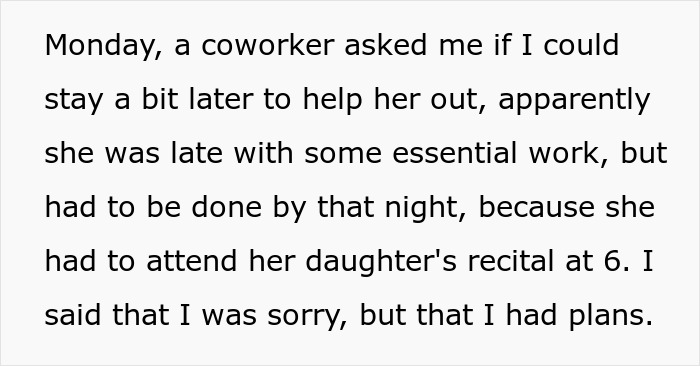There are two kinds of people in this world: those who view their colleagues as family and those for whom work ceases to exist as soon as they punch out.
Recently, reddit user “Flashy-Menu-5587” was pressured into feeling guilty for not taking one for the team after a colleague asked to cover for her because of her daughter’s recital. Feeling that people have no right to shame someone for choosing personal time over helping colleagues out, the author of the post turned to the trusted “Am I the [Jerk]” community to get an external perspective.
Some people prefer to be strict about their work-life ethics, even if that doesn’t gel with colleagues’ expectations

Image credits: Polina Zimmerman (not the actual photo)
So this woman was surprised when all of a sudden she was shamed for choosing personal time over helping a colleague out




Image credits: Pavel Danilyuk (not the actual photo)





Image credits: photopashova (not the actual photo)


Misunderstandings like this help to explain why bonding with coworkers is falling out of favor
While there’s an undeniable truth that the social cohesion of the mid-twentieth century has changed for better or worse, accelerated by remote or hybrid work models that came into fashion after the pandemic forced us to reprogram how we perceive work-life balance; it’s actually been in decline for decades now.
As the Joint Economic Committee of the US Congress found in its report, “Between the mid-1970s and 2012, the average amount of time Americans between the ages of 25 and 54 spent with their coworkers outside the workplace fell from about two-and-a-half hours to just under one hour [per week].” Combine that with a recent study done by BetterUp, claiming that almost 1-in-2 (American) workers define their colleagues just as coworkers, and you could think that most of us treat our workspace friendships as purely transactional.

Image credits: seventyfourimages (not the actual photo)
Despite where we cross the line between workplace and personal life, studies show that people who feel part of the team and can rely on colleagues have a significantly lower chance of burnout. Of course, each to his/her/their own, as this story proves.
Still, more and more workers feel less inclined to socialize and get to know colleagues outside work because of the increasing turnover rates, stating relationships with coworkers as the least important factor of job satisfaction. Surprisingly, Gen Z members are the ones who value being part of the workplace tribe the most, with numbers dropping almost twofold compared to people in their 40s.
Although Flashy-Menu-5587’s boundaries clashed with the expectations some colleagues had for her, stories such as this is an important reminder that no two people are the same and their notion of workplace relationships might be totally different. That’s why the golden rule of thumb in similar cases is to treat others the way you want to be treated yourself. After all, no man is an island.
The author also clarified a few things about the situation






Image credits: Flashy-Menu-5587
In recent years, you might have seen articles such as ‘The unspoken bias that child-free working women face’ (She Defined) or ‘Child-free workers aren’t selfish. They’re being exploited’ (CNN) appearing one by one in various publications. Part of the reason why that is, of course, lies in numbers: as one recent study has found, more than 1-in-5 Americans nowadays don’t want to have children. The other, uglier half of the truth is a bit more problematic.
“Because we live in a pronatalist society — that is, one that highly values reproduction and having children — it becomes easy to denigrate those who choose not to have children,” Debra Mollen, a professor, and researcher of childfree women at Texas Woman’s University, explained to Bored Panda. “One possibility is that some parents envy childfree people, although because this idea is so taboo, parents are unable to articulate it.”
As a case in her point, Debra points to multiple studies that show that throughout the years, starting as early as 2002, childfree women have been statistically viewed as more career-driven, less warm, and less sympathetic than their child-bearing counterparts. “As such, childfree women have reported being tasked with working overtime, working less desirable shifts, and being expected to provide coverage for their parenting colleagues.”
Debra, who is childfree herself, believes that one way to fix this growing issue is to reevaluate the classic definition of ‘family’. “One suggestion is to stop equating having a family with raising children. Having a family is much broader than traditional definitions and can unwittingly exclude many people who don’t have children,” Mollen reasoned.
Someone raised an important question about the author’s morale

Another big hurdle for many men and women alike, who feel like they might be discriminated against for choosing not to have any children, is the notion that they’re missing out on a vital life experience. “Even as more women opt not to have children, widespread romanticized notions about parenting persist,” Mollen said.
“There are still taboos about enumerating the many benefits of remaining childfree alongside similar proscriptions against discussing parenting as anything other than inherently fulfilling and satisfying.” As Debra notes, in 2011, a research found that many parents prefer to keep rose-colored glasses to cope with the challenges of raising children.
Is there a solution, then? Mollen believes that communication is the key. “We both need to have more honest conversations about parenting and provide more opportunities for people to consider and enact being childfree as an excellent choice with many tangible and intangible benefits.”
Most people, however, sided with the author saying there’s nothing wrong with drawing a clear line in the sand























 Follow Us
Follow Us




